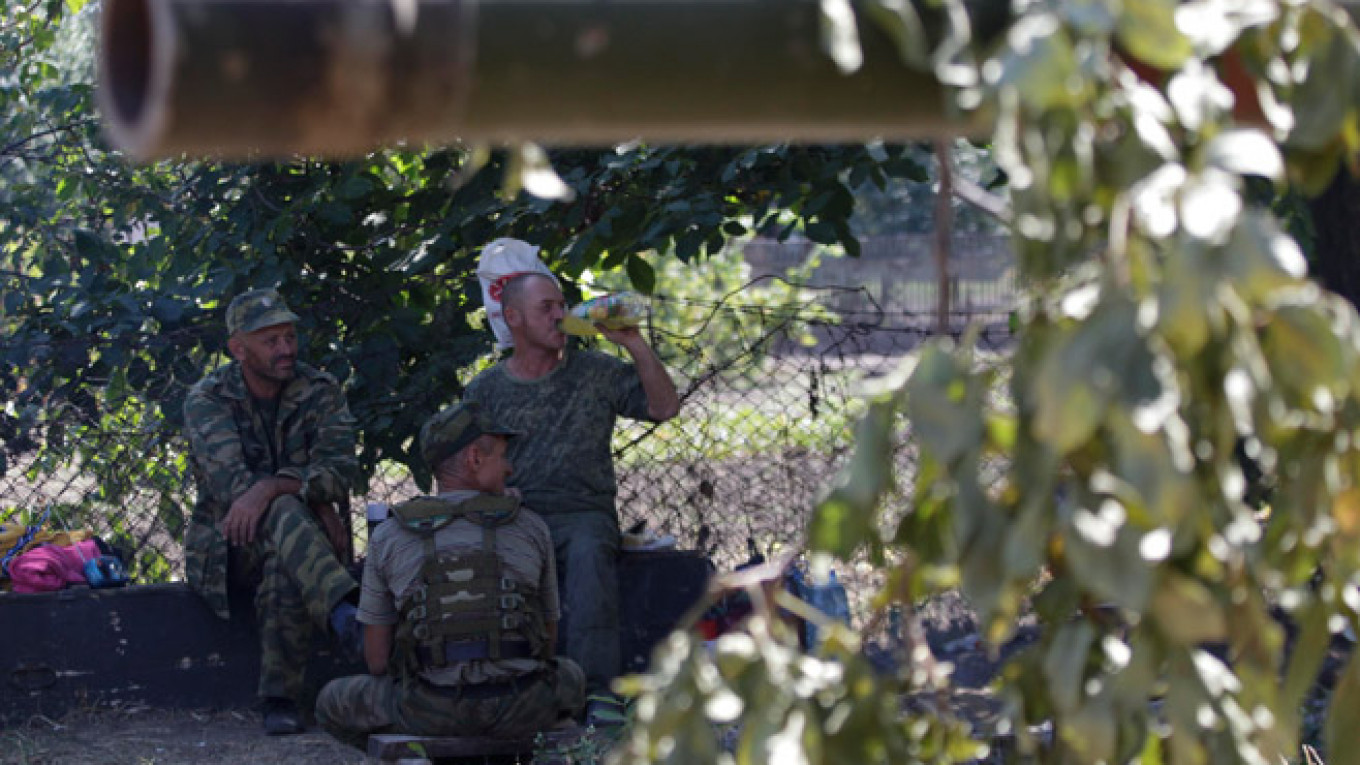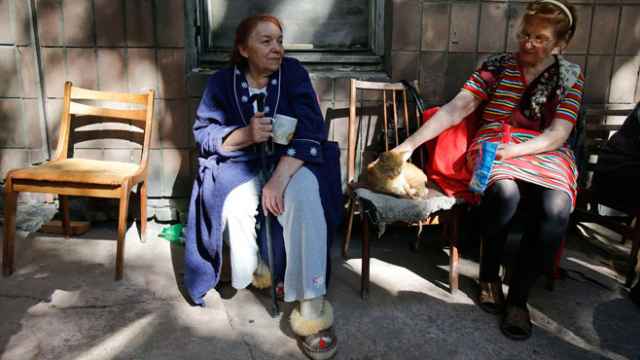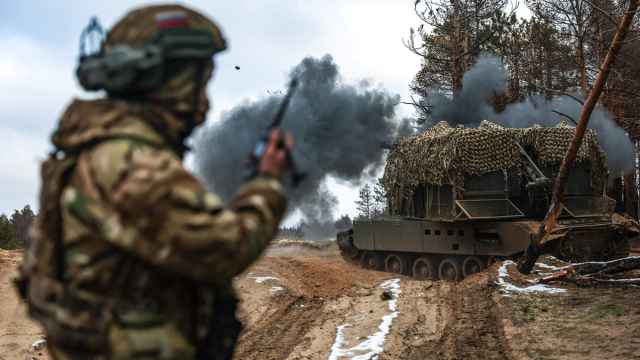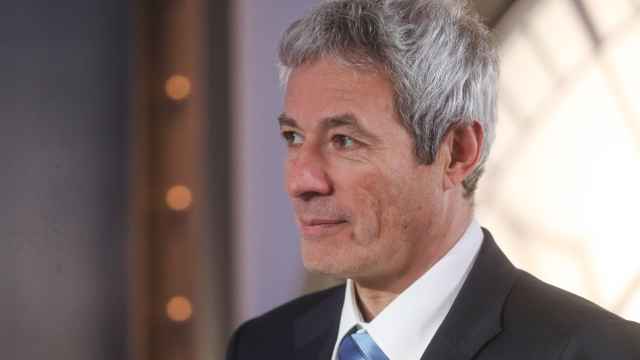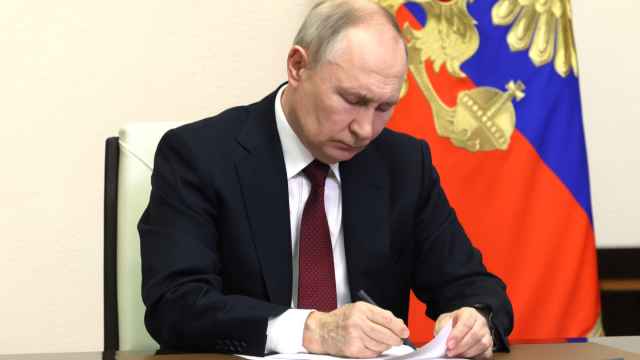Ukrainian President Petro Poroshenko said Wednesday that he and Russian President Vladimir Putin had agreed by phone on a "permanent cease-fire regime" in the Donetsk region of eastern Ukraine.
The statement on the presidential website was altered soon after its release, having originally announced a "full cease-fire," after Kremlin spokesman Dmitry Peskov said Russia could not agree to a cease-fire because it is not a party in the ongoing armed conflict. The sides had merely discussed steps that could contribute to a possible cease-fire, he said.
Ever since conflict broke out between Ukrainian armed forces and pro-Russian insurgents in the country's east, Russia has urged Kiev to consider the rebels a legitimate force with which to compromise. Kiev authorities have labeled the separatists terrorists that are supported by Russia and refused to talk to them.
The prospect of talks has been complicated by the fact that the insurgents did not appear to have a consolidated position and by recurrent reshuffles among their ranks. In addition, the distribution of power across their structures has been unclear, and it is questionable to what extent individual rebel leaders could enforce a compromise, even if one were reached.
On Wednesday afternoon, the Kremlin's press office released what it called "Putin's plan to resolve the Ukraine conflict," consisting of a cease-fire, all sides halting their advances, the unconditional exchange of hostages, and withdrawing Ukrainian troops from cities.
Putin's plan is essentially promoting a truce that could subsequently lead to a frozen conflict situation like those in other parts of the former Soviet Union, analysts said Wednesday.
Internal Divisions
On Monday, Andrei Purgin, the deputy prime minister of the self-proclaimed Donetsk People's Republic, attempted to offer a concrete and unified position for the insurgency during the meeting of the so-called Contact Group on Ukraine.
Purgin told Ukraine's former president, Leonid Kuchma, OSCE representative Heidi Tagliavini and Moscow's ambassador to Kiev, Mikhail Zurabov, that the insurgents would accept their self-proclaimed entities remaining part of Ukraine if they were given regional powers to appoint judges and prosecutors, among other rights.
The day after the talks, however, Purgin's boss — Alexander Zakharchenko, prime minister of the Donetsk People's Republic — said they would settle for nothing less than complete independence from Kiev.
"We do not want to stay within Ukraine's borders, not in territorial, political or financial terms. We want to be equal partners," Zakharchenko told the Business FM radio station.
He also said Purgin "did not have the authority to make any political statements," revealing a lack of agreed functions among the insurgents' ranks.
Leadership Reshuffles
Zakharchenko, an electrician-turned-politician, became chairman of the Donetsk Republic's council of ministers on Aug. 7, replacing Russian national Alexander Borodai. On Aug. 14 another Russian, former Federal Security Service colonel Igor Strelkov, was replaced as defense minister by a local judo coach, Vladimir Kononov.
According to analysts interviewed by The Moscow Times, Russian nationals were replaced by locals to make them more acceptable for potential talks. In addition, the first wave of insurgency leaders was suffering from "emotional exhaustion," as there was little clarity on what its aims were, said Kiev-based political scientist Vladimir Fesenko.
Hand of Moscow
The insurgency clearly does not represent a unified organization with a central command, and furthermore Moscow's interaction with its leaders is varied, according to Alexander Khramchikhin, deputy head of the Institute of Political and Military analysis, a Moscow-based think tank.
"Following rebel advances, the Ukrainian government is ready to make certain concessions. Moscow sees this as a window of opportunity to exploit and come to terms, with the captured territories becoming autonomous within Ukraine. Hence, Purgin came up with the plan," he told The Moscow Times in a phone interview.
"The problem is that many insurgents do not want to settle anything now that they have got the upper hand in the military conflict. It is naive to believe that the Kremlin controls everything there," he said.
His argument is supported by internal divisions within the insurgency. Strelkov clashed with rebel commander Igor Bezler in July, with Bezler calling the Donetsk People's Republic a "banana republic." At the same time, both men have been described as belonging to Russian intelligence services by the Ukrainian authorities.
Frozen Conflict?
Holding negotiations with the rebels would be suicidal for any Ukrainian leader today, according to Fesenko, the Kiev-based analyst. With Russia not willing to give up eastern Ukraine and actively supporting it, the only possible compromise would be to have a temporary cease-fire that will, in effect, become permanent, he said. Therefore it does not matter whether or not the insurgents have a united position among themselves: What matters is to what extent they are controlled by the Kremlin.
"Nothing is more permanent than a temporary solution, so we will see a Transdnestr situation in which there is no permanent resolution, but in which both sides can say that they won," Fesenko, head of the Penta Center of Applied Political Studies, said in a phone interview.
Transdnestr, a breakaway territory in eastern Moldova, fought a war of independence that ended in a 1992 cease-fire brokered by Russia. With a Russian military contingent on its territory, Transdnestr is effectively Russia's protectorate, while internationally it is still recognized as part of Moldova.
If eastern Ukraine follows the path of Transdnestr, it will also join Nagorno-Karabakh, Abkhazia and South Ossetia as a territory of so-called frozen conflicts.
"Ukraine and Russia's aims are not reconcilable, but everybody is interested in a truce, so in effect there will be neither war nor peace," Fesenko said.
The main problem with this scenario is that not all rebel leaders will agree to it, as they are riding the wave of their present military prowess that was largely Russia's doing, according to Fesenko. Therefore it will be difficult to agree on demarcation lines between the warring sides.
In the last few weeks the separatists have extended the territory under their control by capturing several villages and towns and reaching the town of Novoazovsk on the Azov Sea. Many military commentators have attributed their successes to Russia's increased military support or even its direct participation in the armed conflict, allegations Moscow denies.
"The separatists will probably want the rest of the Donetsk and Luhansk regions, and some of them might even want to go further. If this happens, this will lead to a further escalation of the conflict and possibly to an open confrontation between Russia and NATO, so it will depend how far Putin is prepared to go and to what extent he controls the rebels," Fesenko said.
Contact the author at i.nechepurenko@imedia.ru
A Message from The Moscow Times:
Dear readers,
We are facing unprecedented challenges. Russia's Prosecutor General's Office has designated The Moscow Times as an "undesirable" organization, criminalizing our work and putting our staff at risk of prosecution. This follows our earlier unjust labeling as a "foreign agent."
These actions are direct attempts to silence independent journalism in Russia. The authorities claim our work "discredits the decisions of the Russian leadership." We see things differently: we strive to provide accurate, unbiased reporting on Russia.
We, the journalists of The Moscow Times, refuse to be silenced. But to continue our work, we need your help.
Your support, no matter how small, makes a world of difference. If you can, please support us monthly starting from just $2. It's quick to set up, and every contribution makes a significant impact.
By supporting The Moscow Times, you're defending open, independent journalism in the face of repression. Thank you for standing with us.
Remind me later.


